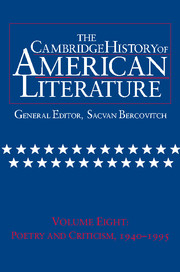Book contents
- Frontmatter
- Introduction
- Poetry, Politics, and Intellectuals
- Criticism since 1940
- Introduction
- 1 Politics and American Criticism
- 2 The Emergence of Academic Criticism
- 3 The Nationalizing of the New Criticism
- 4 The Canon, the Academy, and Gender
- 5 Deconstruction and Poststructuralism
- 6 From Textuality to Materiality
- 7 Cultural and Historical Studies
- Conclusion: Academic Criticism and its Discontents
- Appendix II: Biographies of Critics
- Chronology 1940–1995
- Bibliography
- Index
Appendix II: Biographies of Critics
from Criticism since 1940
Published online by Cambridge University Press: 28 March 2008
- Frontmatter
- Introduction
- Poetry, Politics, and Intellectuals
- Criticism since 1940
- Introduction
- 1 Politics and American Criticism
- 2 The Emergence of Academic Criticism
- 3 The Nationalizing of the New Criticism
- 4 The Canon, the Academy, and Gender
- 5 Deconstruction and Poststructuralism
- 6 From Textuality to Materiality
- 7 Cultural and Historical Studies
- Conclusion: Academic Criticism and its Discontents
- Appendix II: Biographies of Critics
- Chronology 1940–1995
- Bibliography
- Index
Summary
Our narrative is a history of the debates that shaped the field in our time, rather than a venture in canon-formation. Accordingly, the entries that follow are intended to help orient readers who may be unfamiliar with the general biographical circumstances, critical affiliations, and publications of the theorists who figure most significantly in our narrative – i.e., the nineteen critics whose work collectively represents the key moments and movements in criticism since 1940.
THEODOR ADORNO (1903–1969)
The writings of Theodor Adorno (discussed in Chapter 6) are among the most diverse and influential works of neo-Marxist critical theory. The term “critical theory” itself was coined by the interdisciplinary group of progressive European intellectuals who established the Institute for Social Research at the University of Frankfurt in 1923. Breaking with those principles of classical Marxism – economic and scientific determinism, and the doctrine of a vanguard revolutionary proletariat – that they found inapplicable to advanced, highly mediated, and complexly administered capitalist society, the Frankfurt School critics, as this group came to be called, sought to develop a more flexible social, philosophical, and cultural critique. Among their central concerns were the coercive or ideological force of putatively value-neutral instrumental reason, the psychological bases and effects of modern authoritarianism, the sociology of avant-garde and mass culture, the relationship between aesthetic and political criticism, and the role of cultural intellectuals in bringing about social change.
- Type
- Chapter
- Information
- The Cambridge History of American Literature , pp. 454 - 472Publisher: Cambridge University PressPrint publication year: 1996



